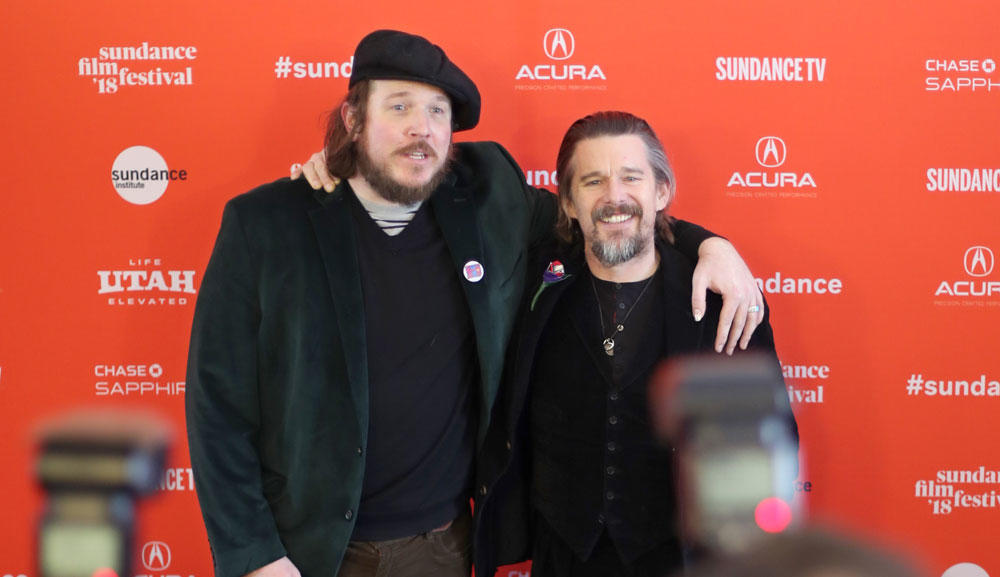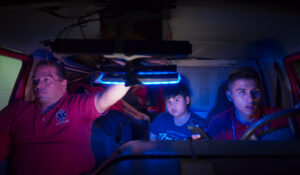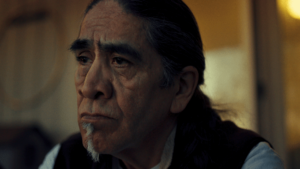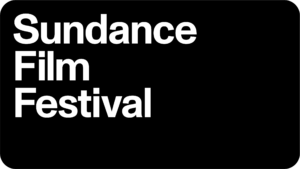Benjamin Dickey and Ethan Hawke attend the premiere of ‘Blaze.’ © 2018 Sundance Institute | Jonathan Hickerson
Sundance Institute
Sundance.org is dispatching its writers to daily screenings and events to capture the 10 days of festivities during the Sundance Film Festival in Park City, Utah. Check back each morning for roundups from the previous day’s events.
BLAZE
by Eric Hynes
Festival mainstay Ethan Hawke returned on Sunday to premiere his fourth feature, BLAZE, his first to be featured in the U.S. Dramatic Competition. Based on a memoir by Sybil Rosen, BLAZE is the true story of Blaze Foley, an outlaw country singer-songwriter whose influence outdistanced his notoriety and recorded output, and died tragically in 1989 at the age of 39. The film recounts his friendship with folk legend and collaborator Towned Van Zandt (played by Charlie Sexton), as well as his marriage to Rosen (played by Alia Shawkat). Foley is played by Benjamin Dickey, new to the screen but a respected singer-songwriter in his own right.
“Ben and I have been friends for a long time, and I’ve been a fan of his music and writing for as long as we’ve been friends. Two years ago, on New Year’s Day, cleaning up as one does and slightly depressed as you are, and Ben started playing ‘Clay Pigeons’ on the guitar,” Hawke said during the post-screening Q&A, referring to one of Foley’s most celebrated songs. “Now Ben’s from Arkansas and Blaze is from Arkansas, and Ben’s a big boy and Blaze is a big boy, and I was like, ‘Man, you should play Blaze Foley in a movie.’ And then the hair went up on the back of my neck and I thought–oh, I’m supposed to do that.”
From that notion, Hawke was introduced to Rosen’s book, Living in a Tree in the Woods, then reached out to Rosen. Over their first dinner together, Rosen agreed to collaborate. “I told you that you were Blaze’s best shot,” she said. “I thought that was really cool at first,” he said. “Now this is not a documentary. This is using Blaze’s songs and work and Sybil’s book to make a work of art. But the weight of it being Blaze’s best shot felt like a huge responsibility.”

That responsibility was then passed along to the actors, particularly the two leads. Dickey talked about the challenges of playing an artist whose work he revered, and whose widow would be present throughout the production. To prepare for the role, he started with the music. “I listened to only Blaze Foley for probably three months, and learned his songs. Then I read Sybil’s book, and that got my about 30% into the territory that I felt that I needed to be in. Then I started writing Sybil from Louisiana while she was in Georgia, and we wrote 2 to 3 times a day,” he said. “She made me feel calm in the notion that it was okay to be Blaze for a little while. There’s something a little bit shameful about standing in the void where somebody used to be. No matter how good your intentions are. You feel like you should not do it. But writing Sybil I got real safe in the place of being Blaze, and feeling like we were trying to tell a story. And I think Blaze gave me permission in certain ways to do what we did. It was really him through people that loved him.”
“I think what I really gave you permission to do was be yourself,” she said.
Rosen and Shawkat talked about their close collaboration, which allowed each of them to reach into new territory, personally and professionally.
“I was nervous to play someone who’s not only living but would interact with on a daily basis. We decided I wouldn’t be mimicking, but creating this new love story. I remember telling her that I haven’t acted much where I get to fall in love and play the romantic type. And she said this is the perfect time, you get to fall in love,” she said. “There’s a lot of me in Sybil.”
“I felt that the Sybil Alia created was really so much sturdier than I was back then. And it was so beautiful to see that. It was like Sybil healed, or something. It was so nourishing for me,” Rosen said.
Check out Cinema Cafe with Ethan Hawke and Rupert Everett below.
Minding the Gap
by Dana Kendall
A kid picks up a camera to make skateboarding videos of his friends, and somewhere along the way he creates a years-long, character-driven vérité documentary exploring male friendship, masculinity, violence, and adulthood.
Minding the Gap’s 24-year-old director, Bing Liu, grew up in the small Rust Belt town of Rockford, Illinois, where he spent most of his free time skateboarding with his friends, Keire and Zack. But skateboarding wasn’t just a pastime for them; for all three, it was an escape from their volatile homes. Delving into that side of their lives, we peer into moments between Bing and each of his friends that are so raw and personal, you wonder whether they remember that the camera is there at all.
Bing says he didn’t originally set out to make such an intimate documentary. Even when he did decide to make a feature film, he didn’t always know he would focus on his two friends. “Every year was an accident,” he said. His first year, he thought he would interview skateboarders all around the country, but after starting a fellowship with Kartemquin films, he realized he had a story with Zack and Keire.

At the film’s premiere, Liu joked to his film subjects and friends, “I feel like you guys thought I was just making a skate video and you wondered why I was interviewing you off the board so much.”
Keire added, “I was just willing to do whatever I could to help you. And it was like five years down the road and I’m like, ‘We’re still doing interviews?’” But Zack, on the other hand, could tell where the project was going. “I’ve known you for a long time, Bing, and I’ve seen a lot of your footage, … and I knew it was coming. I knew I was screwed.”
The film bravely embraces the challenges of its subjects — whether it’s Keire’s struggle to reconcile feelings about his father, Bing’s confrontation with his mother about his unhappy childhood, or Zack’s rocky relationship with his girlfriend and child. We watch the moments unfold when they begin to question how their pasts have affected them, and whether they could ever become capable of treating others the way they themselves were mistreated.
But despite the vulnerable position they were put into, in the end the subjects were honored to be a part of something so beautiful and far-reaching.
Editor Joshua Altman, who took the years and years of dynamic footage (much of which Bing shot while he was on a skateboard himself) and crafted it into a cohesive, flowing, striking story, expressed his admiration for the openness of all of the film’s participants: “We live in an era where a lot of people post about themselves [on social media], and you take 10 photos and you pick the best one and you put your filter on it. And this was completely unfiltered and just open and honest, and I have such admiration for them and for their courage, for coming out here and sharing it, for standing up on stage here.”
Ultimately, Liu hopes that this story will help improve relationships among families. “I want healthier families, healthier relationships between sons and fathers, sons and mothers, [and] spouses. I just think we need to do a better job of communicating these things. And it’s not just one thing. That’s why I had to keep filming, because all of these things sort of stacked on each other to form how people grow up and learn behavior.”
Skate Kitchen
by Jeremy Kinser
With Skate Kitchen, a captivating drama about a collective of female skaters in Manhattan, filmmaker Crystal Moselle makes a smooth and valid transition (in the parlance of her characters) to narrative filmmaking after nabbing the U.S. Documentary Grand Jury Prize for The Wolfpack three years ago. Her new film screened in the NEXT section of the Festival on Sunday night.
Although comparisons to Kids, as well as past Sundance victories such Beach Rats, are inevitable, Moselle has crafted a unique testament to young women who can hold their own against their male counterparts. Eighteen-year-old bespectacled Camille (impressive newcomer Rachelle Vinberg) is frustrated with her home life with her domineering mother in Long Island, and after a skating mishap (described by one character as “credit carding”), she decides to escape to Manhattan and immediately becomes involved with Skate Kitchen, a group of female skateboarders with whom she establishes a camaraderie until she becomes involved with a boy from the rival gang of skaters.
The cast was discovered by Moselle on a train. During the post-screening Q&A, Vinberg said that the director seemed interested and approached her to ask if there were more girls like her. Moselle added that she began talking to Rachelle about the skateboarders and formed a short story from her life experiences, and the script for the feature evolved from there. “I don’t choose things; they choose me,” Moselle shared. “Then I give up my entire life until I finish it.”

Moselle admitted that the film came together very quickly. “I get a sense of urgency when something needs to be done and I saw that they were growing up before my eyes very quickly,” she said. “They were going to college, so it had to happen that summer. A year ago at Sundance, I didn’t even have a script or funding, but I had a really great agent and producers who helped bring it to life and trusted that something beautiful was going to happen. We almost lost our minds, but we have this at least.”
Although the dialogue seems very improvisational, Moselle insisted there was a script. “I’d write notes and they’d reenact it and I’d make them rehearse it so many times,” she revealed. “There was a script, and we went by the script, and the rough cut ended up being four hours and 45 minutes.” She joked, “It changed a little bit in edit.”
Check out the “Fresh Faces” panel with ‘Skate Kitchen’ actress Rachelle Vinberg.
Seeing Allred
by Jeremy Kinser
The aptly titled Seeing Allred, a new documentary from filmmakers Roberta Grossman and Sophie Sartain offers a look at the lengthy, milestone-filled career of ubiquitous discrimination attorney Gloria Allred. The film premiered in the U.S. Documentary Competition ahead of its Netflix debut to an audience clad in the documentary subject’s signature red, either literally or figuratively.
The film opens with a clip from Dinah Shore’s ‘70s talk show where Allred stands up in the audience to dress down a comment she found chauvinistic. It’s one of many memorable moments among a trove of archival footage that illustrates that Allred has always been a vocal advocate for the rights of minorities, from standing up for spousal abuse victims during the O.J. Simpson trial to harassment claims against our current president.
Besides many of Allred’s countless TV appearances to argue for the rights of minorities, viewers get a behind the scene glimpse into Allred’s life. She’s forever on the go, pulling a suitcase behind her, ready to give an impromptu speech, even on the steps of the Lincoln Memorial when confronted by right-wing zealots. The documentary might not win Allred new fans, but it certainly offers further testimony to her claim as the most fearless women’s rights attorney in the United States.

The post-screen Q&A was practically a lionization of Allred. Some audience members dabbed away tears, as Allred instructed the crowd to continue the fight against discrimination. “You are the change you want to see in the world,” she shouted. “You are the leaders you’ve been waiting for.”
Grossman said that she and Sartain had approached Allred about making this film, but it had taken a long time to convince her to agree to the timely doc. “We couldn’t imagine the climate we’re in now and what has transpired over the last year,” she added.
Producer Marta Kauffman pleaded with the audience to continue to tell important stories. “What we’re trying to do here by making this documentary about Gloria is hopefully have a greater impact,” she stated. “To all the women and the men here who are filmmakers, tell the story.”
Shirkers
by Eric Hynes
The screening of Sandi Tan’s Shirkers on Sunday afternoon at the Egyptian Theatre was something like a double world premiere — one embedded within another. Tan’s first-person documentary recounts her youth in Singapore, where her passion for punk rock zine culture and independent cinema led her and her friends Jasmine and Sophie to make a scrappy film of their own, the original Shirkers. The three enlisted the help of their mysterious mentor Georges Cardona to shoot the guerrilla-style thriller about a teenage assassin. But after the young women went back to school that fall (they were all attending universities in other countries), Georges commandeered the reels of film and vanished from their lives forever. Tan endeavors to find out what happened to Georges, as well as the footage — some of which actually appears here for the first time, 25 years after it was captured.
Many in the audience were taken by these glimpses of the original film from the ’90s, and Tan was asked if she ever intends to finally complete the film. One of the roadblocks is the fact that the sound recordings have been lost; the other is that Tan also serves as the lead performer in the film. “My greatest horror for a year of editing was just seeing myself and hearing myself,” she said, referring to the fact that she provides voice-over throughout the documentary. “This was my teenage zombie self. So for the longest time I didn’t want to think about putting it together.” Jasmine, who reunited with Sandi and Sophie on stage, suggested crowd-sourcing the footage in a What’s Up, Tiger Lily?–style competition. But she also seemed as content as Tan with the notion of it never coming to fruition. “Maybe this is the only way this film should have been. You can’t resurrect it; it was a film of its time. So maybe it’s a good thing that it was lost,” she said.

Another questioner wondered how their lives would have been different had the film been completed and released when they were younger. “I think had this film been made, nobody would have understood us in Singapore. They would have thought it’s just a crazy film that doesn’t make sense and the world would have buried it. And the three of us wouldn’t be dreaming in film; we’d be lawyers and doctors and dentists.” But Jasmine had a different take: “Actually, we would have done a ton of service to the Singapore cinema scene, because it would have spurred people to go, ‘What is this crap? We can do better than this.’ It would have catalyzed a lot of people to go out and do things.” And despite the setback and heartbreak of the film being lost, Sophie noted that all three of the women persevered and went on to careers in film. “We all had fire in our bellies and passion for cinema. And that never left,” she said.
They also discussed Cardona, who, though he’s discovered to be deceased, still haunts the whole enterprise. “You know he’s in the audience right now,” Jasmine joked, adding that she’d “kick him in the balls” if he actually were. Tan said she struggled with how to feature Cardona without rewarding his behavior. “He loved being talked about. And I didn’t want to give him the satisfaction,” Tan said. “But at the same time, he’s such a part of me. My love for storytelling, and my darker parts, I owe to him, I guess — which is a strange thing, but it’s true.” Meanwhile Jasmine noted that he would have enjoyed the film. “Some of us may hate to say this, but [this film] is a little tribute to him and his filmmaking and the films he wanted to make. And it was from his eye that a lot of this came about,” she said, to a chorus of deep sighs. “It’s okay, there’s therapy for that.”




